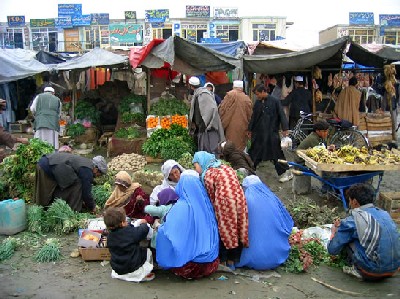As the news of Abdullah Abdullah’s withdrawal from the run-off election in Afghanistan broke, I was watching Penny Flame talk about her intimacy issues on Sex Rehab with Dr. Drew. I was surprised to see Flame on the show. I immediately recognized her, but didn’t realize internet porn had made her famous enough to land on a cable series. I realize this is the haven of Vern Troyer, CC DeVille, and Bronson Pinchot, but I confess, without much pride, that my estimation of porn actors was even less than that.

I knew Flame ‘s work mostly from a series she did on BangBros in which three or four women would target random men in malls and auto repair shops then have sex with them. It was like Vaudeville, celebrating total randomness and the simplest mechanisms of physiology. I especially like the scattershot selection of men in the videos, many of whom were doughy convenience store clerks with small-ish penises and the occasional bought of impotence. There is something both heartless and completely satisfying in watching a chubby man with a small nub of penis berated by four naked porn stars. Call me a masochist.
Flame was always the most aggressive of the bunch. Her voice sounded raw from cigarette smoke and her eyes would bulge out in giant white spheres to punctuate some bragging-point about how much dick she was hoping to get. I felt something violent and confrontational when I watched her, as if sex with her was an act of scorn for the pathetically single-minded man and his even more single-minded penis.
Seeing her on Sex Rehab, with all its attendant staging and self-promotion, I felt a sort of relief to see that there was a normal human being underneath the hormonal sex-Nosferatu in her videos. A plodding and ego-centric Jennifer Ketchum operating the oiled joints and sliding gears of Penny Flame. Both are media constructs, but one points away from a real person and the other points back towards her.
In reading about Afghanistan, I am reminded of that scornful writhing on top of one extreme or the other. The eye-bulging bravura of either side, arguing about what should be done with US troops and whom they should be targeting (as if so many people could even pick a Taliban from a taxi driver—I could not). There is an undertone of failure in every argument surrounding Afghanistan, and the debate is typically binary and militaristic. Do we stay and fight the Taliban, or do we concede that the fight with the Taliban wasn’t ours in the first place and shouldn’t have been taken up.
There’s a dire narrative in this framing of what’s happening in Afghanistan, and I think any argument about foreign policy that hangs on drama, or even makes sense as a story, deserves mistrust. Narratives tend to require villains, and villains necessitate fighting, and that has come to dominate much of the popular understanding of the US presence in Afghanistan. We’re there to fight, and after 8 years, it appears fighting has not produced any profoundly positive results, so it’s time to leave.
A few weeks ago, Peter Galbraith, the aide to the UN’s Special Representative in Afghanistan, wrote about how he was fired for pushing to postpone the election in Afghanistan as evidence mounted throughout the spring and summer of the Independent Election Committee fraudulence. Rather than face the serious corruption of the championed administration of a barely coherent national unity movement, the UN chose to ignore Galbraith’s reports and, instead, fired him to preserve the “best interest of the mission.”
Democratic elections make better stories than do false starts and willful corruption of an administration upon which American interests have desperately hung their hopes of success. We want to race towards the third act of this story, and so the means of getting there become expedient to the ends, an Afghanistan that we can leave in the same obscurity in which we found it in 2001. We want a narrative, tragic or heroic, that justifies the forgetting of that place. We gave you democracy, and democracy gave you another despot. None of our business, you take it from here.

The granular stories of trying to build roads that connect the capital to the desolate mountain regions to the North, a precondition for any functional economy, are not important. It doesn’t matter that polling stations were put on record without anyone to work them so long as a winner could be declared in the end. It doesn’t matter that the president of the country, whose authority is said by many to reside only in Kabul, has now ensured himself another term as head of a local fiefdom, in a country made up of scattered fiefdoms.
According to this view, we are then de facto army fighting against the regional leaders that oppose the one the US has sanctioned in his tiny bubble of influence. On these terms, to ask the question of whether or not US forces should be lessened is to answer one’s own question: of course. Ironically, Obama has said he won’t significantly reduce troop levels in Afghanistan, even if he chooses to ignore General McChrystal’s request for an increase.
Which leaves another series of questions in between the “yes” and “no” of withdrawal: what needs to be done beyond military strategy to make Afghanistan a more stable and prosperous place? There are the terrible and mundane arguments that are much less scintillating to think about. Where should the next road be built? Who should pay for it? How to transition Afghani farmers away from poppy? Is there an emerging political class among the Taliban that can be tolerated in a participatory democracy?
News of Mr. Abdullah’s withdrawal also coincided with an asterisk of a news story from Radio Free Asia about six Uyghur men who had just been released from Guantanamo after seven years of detainment. The men were refugees from China, where Uyghurs have had a long and contentious history with the Han. They had fled into Afghanistan and were picked up for possible terrorists. Now they’re sitting in Palau without a country to return to. Like two other Uyghurs released earlier this year, they may wind up settling this new and unexpected tropical home on which they find themselves, far away from the frigid dust and hardscrabble rocks of their home territories.

It’s easy to forget that in the midst of all the high-level talk of strategy and realpolitik, individual human beings are affected by all this, on both sides. Whatever solutions await, they deserve to be left better off that when we started.
I don’t know how Sex Rehab will wind up for Jennifer Ketchum, but I suspect the struggle to manage her compulsions will be a lifelong journey. I hope it’s an ascendant one.
I really don’t see how America can ever be successful in Afghanistan or in any endeavor that could be labeled as “nation building.” What kind of pride do you instill in a people by fighting all their battles for them? Imagine if the French had conceived and fought our revolution for us.
And even if our victory could be proven inevitable with prolonged occupation, we still don’t have any money.
Poignant and insightful, per usual. 🙂
Any real lasting and meaningful change in Afghanistan or anywhere else is only going to come when the people of said nation are the drivers and movers of the process.
Using institutions and rule sets are a sort of top-down approach to causing change in society, but top-down approaches rarely create any lasting impact. Real change begins at the individual level, where people come to believe in a direction for themselves.
I don’t think there are any sufficient historical examples of a country coming into another country, imposing its will, and that nation bending to it. (maaaaaybe Japan, post WWII?)
American freedom wasn’t caused by another nation invading the American colonies, telling them to become a democratic nation, and expecting it to happen or else. The American system was born out of the idealistic changes happening in the people of the time.
Afghanistan, Iraq… these nations haven’t had that history, or those ideological shifts. I’d be shocked to see meaningful change happen in my lifetime.
On another sad note 😦
– http://news.yahoo.com/s/ap/20091104/ap_on_el_st_lo/us_gay_marriage_maine
… The humor is hilarious, the siuoatitn it assesses tragic. McCain, however, would not have dealt with it any better.”This comment, apparently written by a Democrat supporter, seems to be saying that America has the best President it can get. It is divisive,although it seems to make sense, and keeps the country at loggerheads rather than trying to unite it.There are a lot of these, usually signed as “anonymous” for whatever reason the writer chooses. My policy is to ignore this type of comment.As for Barry’s actions, I have warned before to look at his upbringing and early youth influences and education.
Ed-o: Yeah, I just heard all the bad news about gay marriage. Have half a mind to launch into another moral screed, but maybe I’d better wait a while.
Anyway, I think a big problem is the terms with which we describe our involvement in Afghanistan. Freedom, democracy, independence, these are all relative and fundamentally unachievable terms in any country. But if our project is to build a paved road from Kabul to each province in the country, one that’s secure and decently maintained, help encourage the economy to return to its non-narcotic roots of grapes, pomegranate, raisins, and livestock raising; we’ll have done a lot. And it’s all much more achievable than eradicating terror, or installing freedom. There are terms in which the mission there can be successful, we’re just not using those terms now.
Will: “Imagine if the French had conceived and fought our revolution for us.” That was sarcasm no?? Surely you know about all of the non-anglo troops that came to the US to fight on the side of the “rebels,” quite a lot of Frenchmen included (I was just bumbling down Lafayette St last night, the man who many have argued was at the heart of the military operation that turned the tide of the war irrevocably for the US). And that’s to say nothing of the French Navy’s role in the war, nor all the money they gave to the cause. They might not have fought the whole war for us, but they were part of the coalition of the willing. I don’t recall anyone in the Northern Alliance complaining that the US had arrived, at long last, to give arms to their fight against the Taliban, a not entirely homegrown group in the first place.
Anyway, no one should have the job of “nation building,” I agree. But “road building” wouldn’t be such a bad endeavor, nor farm subsidies. We don’t have to tell the Afghani’s what to do with their country, but after 8 years of blowing all their stuff up, we could do a better job of cleaning up and leaving their infrastructure in a humane condition.
Indeed. We like to think of ourselves as a charitable and humanitarian nation, but when we go on these missions to “make the world a better(or safer? ish? … naw…) place” it would be heartening to see some actual aid being given. People’s lives, the quality of their existences, are important, even if they don’t give us something “valuable” in return. We’re a bit too fundamentally selfish, I think.
Mike: Yes, I know about all that. That’s why I referenced the French. The operant word in that sentence was “conceived.” The French didn’t invade the U.S. and decide we should have a revolution and put a democratic government in place. That was our idea. And they never occupied the U.S. like we occupy Afghanistan. The relationship was an alliance, not an imposition. America has been meddling in the middle-east for decades, and it has done us nothing but harm. We keep doing the same things over and over again expecting different results.
And fixing their economy is a nice thought, but we don’t have any money with which to do it. Unless it can turn a profit for us, it’s untenable. We have too many domestic issues and too large a deficit to be bleeding ourselves dry for a nebulous set of objectives, all for an outcome that could be charitably forecasted as “unfavorable.”
The comparison a bit wonky on those grounds then, since the Taliban had only been in in power for 7 years in 2001 and they were, in many ways, a foreign body that first sprang up in Pakistan, then invaded Afghanistan and overthrew the government of that destitute country with bought weapons. It was less a revolution and more of a foreign invasion, financed largely by Al Qaeda, a nationless group. There might be a comparison if France decided to side with the Native Americans and fight against the colonists, but otherwise I don’t see a strong parallel. If the US left, it would be just trading one occupier over for another…
It’s not a question of fixing their economy, but doing something to make it better, and more self-sustaining. To say fix is to admit that there is no end point. But to say “improve” is to allow for tangible goals that can be said to have been successful and grounds on which to determine whether or not the country could stand on its own against foreign pressures without US military support…
I’m not sure where you’re getting all this, and the example is getting so hairy that I think it’s time to take it out into the woods and set it free. My point in saying, “Imagine if the French had conceived and fought our revolution for us,” was to say that if the bulk of the ideological motive power comes from a foreign body, any effort on the part of that foreign body will be in vain. No matter how long we stay or how much we do, it will all fall apart once we leave, if the people have no will to sustain it. And where does that will come from if the people do not earn it for themselves?
That’s what I should have said in the first place. It might’ve saved time.
I get your point. It’s true enough in a vacuum, but I don’t think it’s a true reflection of what the US mission in Afghanistan has been. It has been war, but it has not been an act of imposition of an ideology, save democracy, an approximation of which is what the Afghani’s were heading towards after the Soviet expulsion and before the Taliban takeover, and what a lot of people were fighting for in the years before the invasion Abdullah Abdullah, for instance, was one of those who’d spent a decade fighting for democracy for Afghanistan in relative ignominy. The US hasn’t imposed an ideology on him, they’ve just joined the cause against a common enemy while trying to give the country some framework for self-determination. In other words America didn’t start the war in Afghanistan, it just gave to one side the benefit of overwhelming military force. The unfortunate part was that the decision was made on 3 weeks of planning with almost no thought as to what would happen after. The only real ideological motivation was to kill the Taliban, and once that had been accomplished, no one knew what do next. So it’s not the failure of a US ideological motivation, it’s that there wasn’t one to begin with.
All of which I say without ever having been in that country. But it’s the best estimate of truth I can get to on the point…
I still think the whole operation is fundamentally flawed, but I was 10 years old on Sept. 11, 2001 and didn’t start paying attention to much of our little dalliance with the middle-east until recently. So I’ll let you have this one. I’ll be back, though…
I’ll be watching internet porn in the meantime..